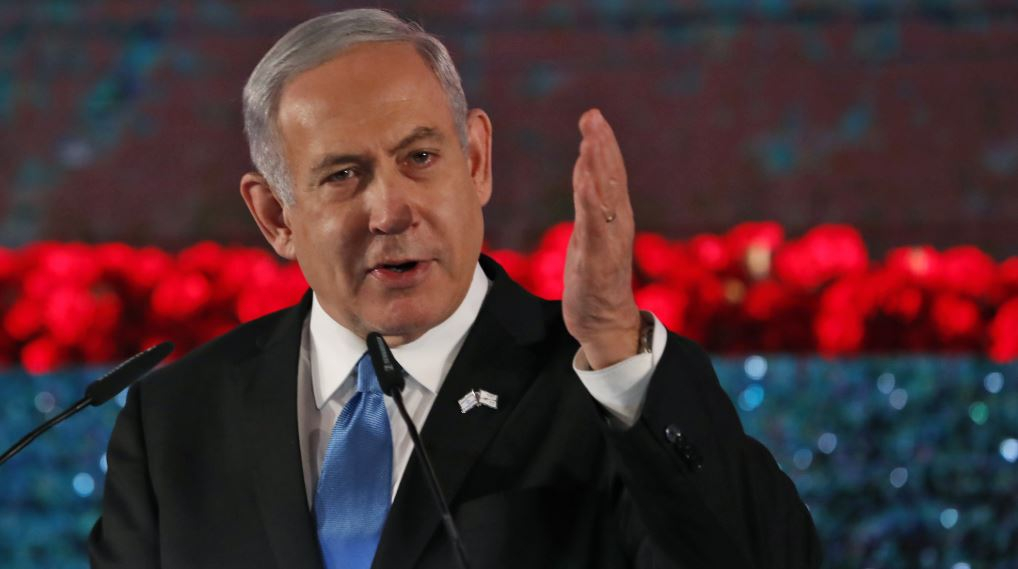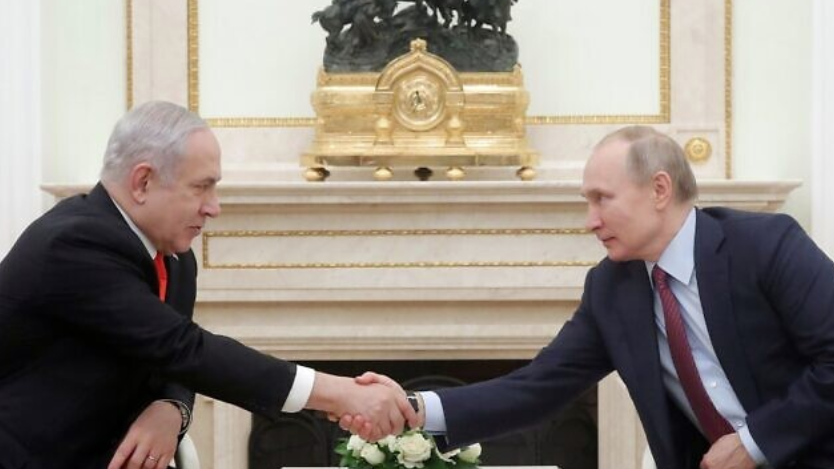
Israeli Prime Minister Benjamin Netanyahu delivers a speech during a ceremony in Jerusalem, January 23, 2020. /AP Photo
Israeli Prime Minister Benjamin Netanyahu delivers a speech during a ceremony in Jerusalem, January 23, 2020. /AP Photo
Editor's note: Andrew Korybko is a Moscow-based American political analyst. The article reflects the author's opinion, and not necessarily the views of CGTN.
Israeli Prime Minister Benjamin "Bibi" Netanyahu is coasting into his country's third elections on March 2 with the success of two tremendous achievements over the past week that was interestingly made possible by both American and Russian Presidents. U.S. President Donald Trump unveiled the long-awaited "deal of the century" earlier this week, after which Netanyahu immediately traveled to Russia to meet with President Vladimir Putin to discuss it in detail and also return home with Naama Issachar, who was just pardoned by him for her drug conviction.
The first of Netanyahu's victories was globally significant because the world has been eagerly waiting to see what Trump's team envisaged for bringing peace to the Middle East. Although the deal itself has been widely criticized, there isn't much that anyone can do to stop the U.S. and Israel's unilateral moves in implementing it if the Palestinians continue to oppose this controversial plan. Netanyahu is assured of American support, which is all that matters in practical terms.
Concerning the second of his successes, the Israeli Prime Minister triumphantly returned to his homeland with the dual Israeli-American citizen who had previously been sentenced to 7.5 years in a penal colony after her arrest last April. The Russian authorities found over nine grams of cannabis in her luggage, as she was transiting through a Moscow airport from India back to Israel, and thus accused her of drug trafficking. President Putin's pardon stated that he was guided by the principles of humanity, which Netanyahu sincerely thanked him for.

Russian President Vladimir Putin (R) meets with Prime Minister Benjamin Netanyahu at the Kremlin in Moscow, Russia, January 30, 2020. /AFP Photo
Russian President Vladimir Putin (R) meets with Prime Minister Benjamin Netanyahu at the Kremlin in Moscow, Russia, January 30, 2020. /AFP Photo
Altogether, these two achievements will predictably boost the Israeli incumbent's chances of winning his country's third elections in a year in early March. It doesn't mean that he's guaranteed to do so, but both the American and Russian leaders would be indirectly responsible if he did. To be clear, they made their decisions based on the calculation that they'd improve state-to-state relations, not necessarily because of their close personal relations with the Israeli premier.
Nevertheless, it's intriguing to point out that these two geopolitical rivals share some common ground when it comes to Israel. The U.S. and Russia each cooperate with it on a very high strategic level, though in somewhat different domains. America is fully in support of everything that Israel does and therefore voluntarily decided to author a peace plan that entirely serves Israel's political interests, while Russia cooperates real closely with it when it comes to Syrian affairs and thus advances the self-professed Jewish State's security interests.
The key takeaway from this observation is that third countries could function as bridges for connecting an opposing pair of states exactly as Israel is currently doing vis-a-vis the U.S. and Russia. For example, Jerusalem hosted the first-ever trilateral National Security Advisor meeting between the Israeli, American, and Russian representatives last June, which showed the world how Washington and Moscow are willing to put aside their overall differences in the interests of jointly cooperating with Tel Aviv on pressing regional issues.
American-Israeli ties have always been strong since Israel's establishment, but it's been under Netanyahu's premiership that Russian-Israeli ties really began to take off. Netanyahu's visit to Russia immediately after unveiling the deal of the century in the U.S. speaks to just how much importance he and the State of Israel place in securing Russian support for this initiative. It also presented him with an excellent opportunity to pull off a soft power coup by returning to Israel with Issachar, who was coincidentally pardoned just the day before.
This was therefore arguably the best week ever in Netanyahu's career since he was able to successfully portray himself as such a strong champion of Israeli interests that he even secured differing degrees of symbolic support from the U.S. and Russia despite their ongoing geopolitical rivalry. With the help of the American and Russian leaders, Israel's international profile has continued to grow despite the heavy criticism that it's historically come under, and especially since the recent unveiling of the contentious deal of the century.
(If you want to contribute and have specific expertise, please contact us at opinions@cgtn.com.)